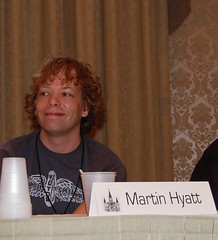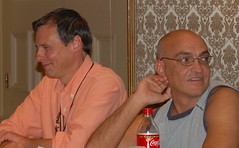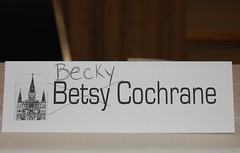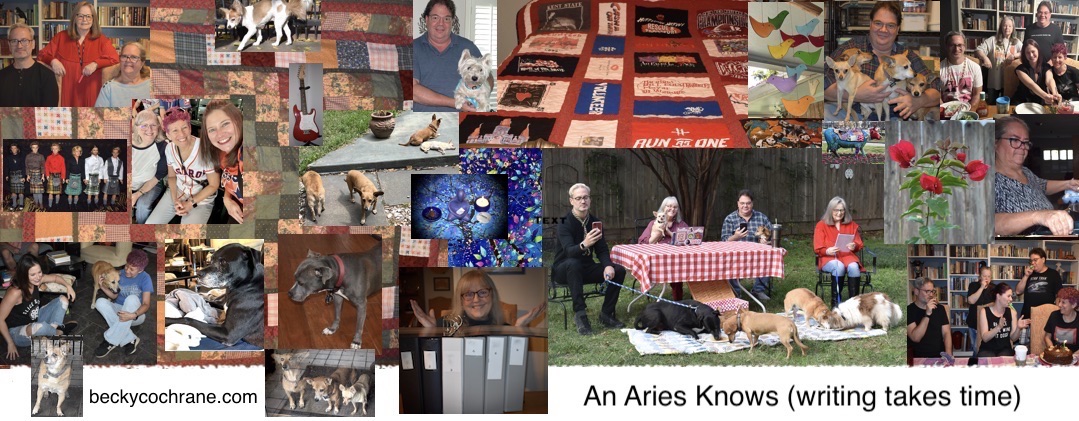 |
I often hear people say that if they just didn’t have to earn a paycheck, if they could win the lottery or find someone to support them financially, they’d finally have time to write that novel.
I’m not sure I believe them. For one thing, I know plenty of people who write and are published even though they have other careers. For another thing, I’m an example of a person who occasionally has months at a time when I don’t work other than taking care of my home and family, and I still have trouble prioritizing and managing my writing time. So I was quite interested in the panel I was given to moderate at Saints and Sinners in May. The topic was “Making Time For Creativity: How to Write With a Full-Time Job,” and the panelists included prolific and award-winning writers Jess Wells, Rob Byrnes, Greg Herren, and Martin Hyatt. After I introduced the writers and made my confession about not always using my creative time for writing, Jess got the ball rolling by listing many of the things writers think we “have to do” that keep us from writing. I immediately sent guilty looks toward Tim, who was sitting on the front row, because I thought “going to the gym every day” would be one of those Who’d argue with that? time-spenders. Later, at the closing party, I told Jess we should do a panel next year called “Bitching You Into Writing,” because she’d motivated me to stop making excuses and get to work. She’s a brilliant and funny speaker, and if you ever get a chance to hear her, grab it! Her co-panelists were equally witty and smart. Marty talked about how writers may, in a sense, be writing all the time. Even though there are periods when we’re not putting hands to keyboard, pen, or pencil, we are always observing, taking in, filtering, and reshaping information that will end up in our writing. I’ve found this to be true. It’s also been my experience that many of those things, like bad relationships and crappy jobs, that I resented over the years because I felt like they stole writing time from me, actually provided a lot of the material that I’ve used in nine novels. Rob and I expressed differing views on “writer’s block.” I tend not to believe in it (since I do see myself as an example of Marty’s theory of “always working”), but Rob talked about some of the hindrances a writer faces, including how sometimes even though everything falls into place to give us the time and opportunity to write, the words just don’t come. I think most of us sitting up front and in the audience exhaled a huge sigh of relief when a couple of panelists simultaneously said, “And that’s okay!” Because there is no single rule that applies to all of us about how much or how often we should write. Maybe there are times we shouldn’t be writing. One of Greg’s points about his own process is how he keeps folders of notes that include ideas he’s had, things he’s seen or heard that spark a story idea, great potential first lines, and various other jottings and phrases that he may use or turn into something. Other people who’d come to hear the panelists agreed that they do this, as well. Jim Gladstone wondered when notes for a specific piece of writing go unused, are they discarded or saved for potential later use? After some discussion of that, Carol Rosenfeld suggested that those notes, and the words we use to develop or explore them, become a part of our writing process. It was a salient point and added to a general sense that as writers, we don’t have to feel guilty about everything we do that’s NOT writing. Doing other work, both menial and fulfilling, or extended periods of thinking about or planning our next writing project, can all fill the well of creativity that will eventually pour itself in our stories and poems and essays. |
| Me with Jess Wells. | |
 |
|
| Marty Hyatt during the panel. | |
 |
|
| Rob Byrnes and Greg Herren on the panel. | |
 |
|
| Jim Gladstone, S&S 2007. | |
 |
|
| Carol Rosenfeld, S&S 2006. |
I had quite a good time, heard much to think about, and ultimately was glad that I, and not my Evil Twin Betsy, moderated the panel.

















